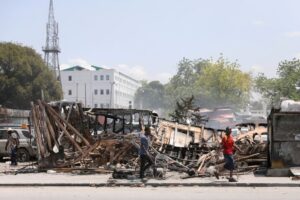This article, published in June in the Madrid-based online space for dialog on the left, Espacio Público, is particular to politics in the Spanish state. But it makes several observations and analyses that are relevant to the left in other parts of the world.
It appeared soon after the June 24, 2022 Melilla massacre, where Spanish and Moroccan police killed 37 African migrants who tried to vault a fence to seek asylum in Spain. [Melilla is a Spain-controlled enclave and legacy of Spanish colonialism on the coast of Moroccan territory.] The self-described “progressive” government of Socialist Prime Minister Pedro Sánchez praised the police action.
Much of the article’s critique is directed at the trajectory of Unidas Podemos, the political party (originally called Podemos) that emerged from the 2011 Occupy-like Indignados mass protests. The revolutionary socialist Anticapitalistas took part in the formation of Podemos, conceiving of it as electoral and movement vehicle that could open space to the left of the bipartisan (i.e., the conservative Popular Party and the Socialist Party) “regime of 1978” that has dominated politics since the end of the Franco dictatorship.
As the article points out, many forces in Podemos—and especially its leaders like former national vice president Pablo Iglesias—had distinctly non-revolutionary ideas. Within less than a decade after its first electoral contests, Podemos had become part of the state’s moderate governing coalition. In 2020, Anticapitalistas decided to leave Podemos, concluding as Raúl Camargo noted “today’s Podemos is no longer that of its origins”.
Members of the U.S. left who have witnessed the ascendancy of reformist electoralism presented as a “new” left politics—from Bernie Sanders’ two runs for president, to the actions of Rep. Alexandria Ocasio Cortez and “the Squad” in Congress, to the shift of virtually the entire left in Chicago into the camp of Democratic Mayor-Elect Brandon Johnson—will find many parallels with politics in the U.S. today.
The ISP has added notes and links to the text to provide readers with context and explanations of references the author makes.
A large part of the left often seems ashamed of having at one time defended egalitarian politics. The extent to which many left-wing leaders go to pretend that they have never defended these politics, or that they are not to much of an irritant the economic powers-that-be, has led them to adopt ways of intervening in politics with people and parties that was characteristic of those on their right.
Abundant examples can be found in contemporary history. Some, and among the most recent, have appeared among political actors who, at the beginning of the last decade, participated in the creation of more than one platform with the will to challenge the regime of 1978, claiming to be the champions of “new politics”. At a certain time, however, many of them closed ranks with those they had wanted to remove from power.
They were reluctant to identify their new formations as political parties, but they vehemently wanted to enter the institutions of government. In no time, they changed course from their initially subversive orientation and signaled that if they went on to share government responsibilities with those they had identified (up to that point) as agents of the right wing, they would not disrupt the system.
They spoke about the “uselessness” of distinguishing between left and right and they consciously avoided using red (socialist) and/or republican symbols. It seemed to them, so they said, that the tricolor (the three-color flag of the 1931-39 Spanish republic), the red flag and what they represent could put the “new politics” on the side of the “losers”. They overcompensated by embracing the concept of a diffuse Spanish “patriotism”, so as not to leave it as the patrimony of the right. With this same intention, they showed significant solidarity with the institutional aspirations of the military and civil service and repeatedly praised the work of the police forces. They wanted to “win” and intended to do so with the support from the left’s traditional voters but also with gestures of understanding to and the embrace of reactionary sentiments. It was a matter, they explained, of building “an electoral war machine”, with a homogeneous leadership, based on unquestioned leaders and the transmission of simple messages, distanced from references to socialist ideas and emancipatory strategies.
Fighting “the caste”
However, for a long time, they emphasized repeatedly their plans to put an end to the privileges of some not very well-defined sectors and privileged social strata. They hardly made a public statement without speaking of the need to fight “the caste”.
In a very short time, they obtained spectacular results at the polls and insisted on their commitment to governing. They celebrated the breakthrough against the two-party system, because, they said, that should serve to correctly apply the Constitution.
The positions they won in various levels of government, after some electoral contests and several disputes, attracted attention. Vice-presidencies, in the national government and in some autonomous (regional) governments; ministries, mayoralties in city halls of the main capitals, positions on parliamentary roundtables and commissions, etc. But the price of winning these was agreement with the forces of the moderate- or social liberal left that they had once categorically rejected—alongside deals to get support from some centrist or right-wing actors. References to the “caste” disappeared from their speeches. They settled into doing what was “possible”. They tried to demonstrate that from their government posts, even in lower-level positions, they could achieve substantial improvements “for the people”.
Especially significant was their praise for the royal family in the Congress of Deputies, hastily justified in the name of increasing the minimum wage. They offended committed democrats, but they served to make clear, “de facto”, their loyalty to the regime of ‘78 and the acceptance of the authority of a hereditary institution such as the Crown.
In what sense are they progressive?
The aspiration to win some kind of socialist society, which the left had upheld in different ways for many decades, had long since been abandoned and locked away in the closet of obsolete ideas. Who remembers that commitment? The leaders and followers of the party that calls itself socialist (i.e., the Socialist Party) have long since buried the idea of social change and have exalted the free play of supply and demand as “the invisible hand”, and the unquestioned regulator of social and economic relations. They share with the neoliberal right the unquestioned devotion to economic growth and to the market.
In the end, when talking about themselves, the “socialist” spokespeople, post-communists and promoters of “new politics” like to identify themselves as “progressives”, defenders of “broad” political projects, of “modernizing,” “different” and “new” ideas—as if these expressions marked off some alternative strategic perspective from that of the right and generate some kind of collective hope in a socially just future.
When they speak of “progressivism”—as they do so repeatedly and constantly—they should explain what they mean. In recent decades we have experienced extraordinary technological progress and an almost permanent economic growth, accompanied by enormous and irreversible destruction of nature, threatening the survival of a great part of humanity. They preach this sort of “progress”: for indefinite economic growth, as if material resources were infinite, as if our planet could withstand everything.
It would be good if the “progressives” would one day pronounce themselves on whether or not it is progressive to question the unlimited right to private property; on how to advance towards economic democracy; how to avoid the increasing concentration of wealth in a few hands and the extreme impoverishment of more and more people; on whether to change the ownership of the means of production of essential goods and services; on the public guarantees of equal and quality universal health care, independent of the interests of the pharmaceutical industry, insurance companies, hospitals and private residences; on how to make effective the right to housing and public services in decent conditions for everyone; on whether or not they have the will to implement at some point a fully public education system, for the entire school population, and not look at education as a business; on the way to guarantee to all people a sufficient income to be able to live in peace and dignity, without the anxiety of not being able to pay for essentials; on the effective right to stable work, not precarious and fairly remunerated; on the right to rest and leisure; on the rights of migrants and refugees; on whether they intend to repeal anti-immigrant laws. They should make explicit their desire to break with any system of capitalist and/or patriarchal exploitation.
The reader already knows that we could go on and on, and list many more demands. But it is not a question of outlining in a short article, a political program for left-wing forces that are not ashamed to champion left-wing ideas. The point is to warn readers about another phenomenon: the obliteration of egalitarian thought, the progressive displacement towards neoliberalism of almost the whole range of political forces and the constant adaptation of those who had defended socialist ideas to the wishes of those who want to “build” economic and government power.
Growth of the extreme right
The parties that today recognize themselves as part of a “progressive” bloc occasionally call for the creation of a “cordon sanitaire” to protect society from the rise of right-wing extremists, even though some of them sometimes prefer not to confront this reality. They often attribute the growth of the far right to media coverage.
There is no doubt that the media play an important role, but the growth of the reactionaries should be seen more as a consequence than as a cause. If the extreme right has a chance to grow, it is because, in the face of a seemingly unending crisis, the old and new left has proven itself incapable of offering a horizon of hope and social justice, of equality among people, guarantees of an effective fight against machismo in all public and private spheres, and a certain confidence that our children can have a peaceful and safe life in the future, in a society of solidarity. If the ultra-right is gaining ground, it is because the left has adapted to an unjust system, refusing to challenge it, while turning its back on the working class and social sectors that underpin an associative, neighborhood, trade union and party social fabric that can defend the rights of women, of migrants, of people suffering from illnesses, of the elderly, of children.
We are again in times of calculations and electoral expectations and the “progressives” are forced to paint their speeches a little red (for social justice), a little green (for the environment) and a little lilac (for feminism). They speak out against the rich, they all claim to be feminists, some of them even recall, at times, that there is a struggle between social classes and that privatizations were carried out against the welfare of the vast majority of the people. They talk about the public sector of the economy and the rights of workers, while mixing that with appeals to “the middle classes”. They also express themselves from time to time against repression, without daring to admit, despite experience and evidence, that once the elections are over, they will remain just as indifferent to the attacks on fundamental rights and freedoms, the progressive impoverishment of the population, the most flagrant injustices, the destruction of the environment…. They say little about the commitments they made in their previous campaigns, almost nothing about the gag law (a 2015 law criminalizing many aspects of protest and dissent, passed by the conservative government), nor about most of the labor legislation they promised to repeal, nor about energy assistance to the poor, taxes, banking, evictions?
They remain, moreover, imperturbably indifferent to a corrupt judicial system, which ignored many episodes of corruption but stole years of life in freedom from leaders and activists who committed “the crime” of promoting the growth of organizations supporting self-determination of oppressed nations and who supported a referendum on self-determination in Catalonia. These activists were released from prison, but not pardoned. Neither have the rest of those indicted and exiled for their ideas and activities in defense of the sovereignty of the peoples.
The “new politics” in the face of the Melilla massacre
The “new politics” got old fast. The people who entered the government in its name squandered the hopes that had been generated in the squares, in the marches for dignity, the demonstrations in support of the refugees, the mareas (mass mobilizations against privatization of social services), and, particularly, in the extraordinary mobilizations for Catalán self-determination. There are many politicians who put their personal agendas above those of the people; who present some reforms and improvements as “historic” conquests; who consider labor precarity to be a thing of the past, against all evidence; who underestimate the tremendous numbers of socially excluded people and who turn a blind eye to the ongoing unraveling of the social safety net.
The political and social drift to the right has been particularly painful of late. The slaughter of dozens of migrants at the hands of Moroccan and Spanish police at the Melilla fence has been openly justified and repeatedly praised by [Socialist President Pedro Sánchez] of the “progressive” government, without the vice-president and the most left-wing ministers of the government coalition raising their voices clearly to denounce these murders stemming from institutional racism.
A politically healthy society would be shocked by this attack, more serious than that of 17A of 2017 in the Ramblas of Barcelona [17A was an incident in August 2017 when an assailant drove a van into a crowd of pedestrians, killing 14 people. The Islamic State claimed responsibility for the attack.], not only because of the number of victims but also because who is responsible. People with any humanitarian sensibilities should be demanding the resignation of the rulers involved, for their inability to control police forces of their own and relations with the regime of Morocco.
The openly xenophobic words of the Spanish Prime Minister in support of those responsible and perpetrators of the massacre are more than worrying, but the lukewarm and belated reaction of the rulers and political leaders to his left is also dismaying. Their absence at the protests against the massacre is symptomatic of their “progressive” drift, in the same way that those representatives who attended the demonstrations showed what side they were on.
During the last decade it seemed that social movements made democracy, respect for freedoms and the value of solidarity fashionable. But the ambition to occupy space within the institutions changed that. Some people underwent a real metamorphosis that led them to resurrect practices that seemed, for a while, to be in the past. Fanatics of “art of the possible” are obsessed with government positions won, with their offices, subsidies and the number of people they supervise. They exclude dissenters, expel dissidents and, as we have seen recently in Andalusia, they even try to prevent those who had been their comrades from expressing themselves in the media and in the streets.
Authoritarian practices that at some point seemed to disappear are back. The “progressive” guardians of order again slander those who want to present alternatives as being complicit with the ultra-right-wing.
With whom and when to get angry
Unfortunately, the reality to be confronted is too often forgotten. That is wealth concentrated in fewer and fewer hands, of growing social inequality and of a chronic economic crisis that continues to be paid for by those who did not cause it.
In trying not to discourage left-wing forces, many keep their criticisms to themselves. But that cannot be the only way to deal with the situation. As the philosopher Marina Garcés explained recently, accepting this means assuming that the damage is irreparable. “They want us to be the world’s nurses while others do harm. To what extent do we have to take care of ourselves? When will the time come to get angry?”
One can still detect among people of all ages wells of indignation born in the face of “a democracy” that isn’t, people who want nothing to do with bureaucrats or infighting, disgusted by bossism, revolving doors between business and government, exclusions, purges, expulsions, censures, condemnations, threats, repression, orders to remain silent….
“They don’t represent us, they don’t”, rang through the squares in the 2011 Indignados protests, in times of mobilizations that gained great popular support. That force no longer exists, but we still see people taking to the streets to protest institutional racism, to defend rights for migrants, to oppose the increase in military spending, to demand the dissolution of NATO and to express their displeasure at those who revitalize Atlanticism from “the new politics” and claim that their meeting in the capital of the State represents a “pride and a pleasure” (a statement from the spokesperson of the left/progressive Madrid city government on Madrid’s hosting of the NATO summit in July 2022).
“That’s the way politics is” people adapted to the establishment often say. Undemocratic practices and horse-trading “will never go away,” they admit. But our response is obvious. If “that’s the way politics is”, then we must look for other ways of doing it, to put collective projects and the associative life of neighborhoods, towns and workplaces above any economic ambition, bureaucratic interest or individual leadership. There are many people who haven’t given up and who still think that another world is possible.




